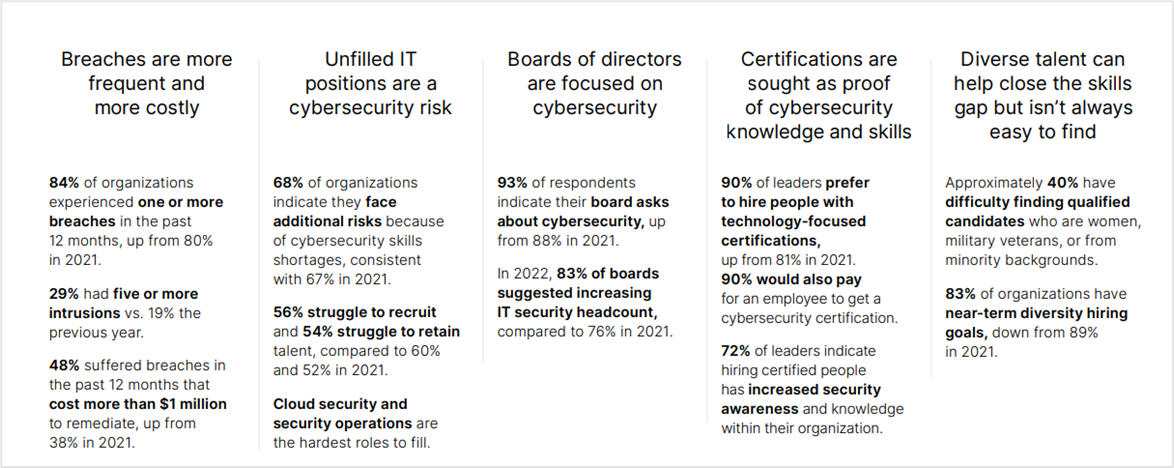Effects of Cybersecurity Skills Shortages in 2023

The increasing shortfall of cybersecurity tech skills and talent across the board has no end in sight. Here’s how employers can alleviate the problem.
Search for cybersecurity jobs online and your page will be flooded with high-paying cybersecurity positions unfilled. In fact, it’s common knowledge that cybersecurity is a growing industry that is desperately in need of skilled professionals. More than 1 million cybersecurity jobs are available in 2023, but less than 400,000 cybersecurity professionals will be trained by then. This huge cybersecurity talent shortage has left organizations vulnerable to and fighting an uphill battle against cyber threats. The number of organizations confirming five or more breaches jumped by 53% between 2021 and 2022, according to Fortinet’s 2023 Cybersecurity Skills Gap Global Research Report.
As alarming as this statistic is, here is a summary of some of the most interesting, and even more alarming cybersecurity statistics from the 2023 cybersecurity skills gap report.

Note: The findings in this report are based on responses obtained from online interviews and an email survey of 1,855 IT and cybersecurity decision-makers, conducted by Sapio Research in November 2022. Responses were obtained from 29 locations: Argentina, Australia, Brazil, Canada, Colombia, France, Germany, Hong Kong, India, Indonesia, Israel, Italy, Japan, Malaysia, Mexico, the Netherlands, New Zealand, People’s Republic of China, the Philippines, Singapore, South Africa, South Korea, Spain, Sweden, Taiwan, Thailand, United Arab Emirates, United Kingdom, and the United States.
Overall results are accurate to ± 2.3% at 95% confidence limits.
81% of cyberattacks were in the form of phishing, password, and malware attacks, with phishing being the most common attack method. These three attacks can target
not only systems but also individual users directly. Phishing schemes are especially treacherous as they often deliver the other attack types: malware and social engineering that can lead to password and web attacks. In 2022, we’ve seen cybersecurity challenges intensify globally in all sectors with the growth of new ransomware variants. Check out our article on 5 Cybersecurity Best Practices To Prevent Ransomware Attacks.
Now that we’ve learned about the effects and impacts of cybersecurity skills shortages, we need to understand what factors have come together to cause the cybersecurity skills gap and how can organizations help bridge this gap.
Top 5 causes of the cybersecurity skills shortage
- Rapidly Evolving Threat Landscape: The threat landscape in the cybersecurity industry is constantly evolving and becoming more complex. Cybercriminals are constantly finding new ways to exploit vulnerabilities, and this creates a demand for highly skilled cybersecurity professionals who are up-to-date on the latest threats and countermeasures.
- Lack of Training and Education: Many cybersecurity professionals do not have formal training or education in the field. This can make it difficult to keep up with new technologies and stay informed about emerging threats. Furthermore, the rapid pace of technological change can make it challenging for educational institutions to keep their curricula up-to-date.
- High Demand and Limited Supply: There is a high demand for cybersecurity professionals in Canada, but the supply of qualified candidates is limited. This can lead to competition for talent, which drives up cybersecurity salaries and makes it difficult for smaller organizations to attract and retain skilled professionals.
- The Complexity of Cybersecurity: Cybersecurity is a complex field that requires a broad range of skills, including technical knowledge, analytical skills, and problem-solving abilities. This makes it challenging to find candidates who possess the necessary skills and experience.
- Lack of Diversity: The cybersecurity industry has a diversity problem, with women and minorities underrepresented in the field. This limits the pool of available candidates and creates a skills gap that can be difficult to fill. Furthermore, research has shown that diverse teams are more effective at problem-solving and decision-making, so a lack of diversity can also impact the overall effectiveness of cybersecurity teams.
Top 5 ways organizations can address the cybersecurity skills shortage
- Invest in Training and Development: Organizations can invest in training and development programs to upskill their existing workforce. This can include providing access to cybersecurity training courses, conferences, and other educational opportunities to help employees keep up with emerging trends and technologies.
- Partner with Educational Institutions: Organizations can partner with educational institutions to develop cybersecurity curricula that align with industry needs. This can help ensure that graduates have the skills and knowledge needed to meet the demands of the industry.
- Promote Diversity and Inclusion: Organizations can promote diversity and inclusion in their hiring practices to attract a broader pool of candidates. This can include reaching out to underrepresented groups, creating inclusive job descriptions, and offering training and mentoring programs to help these candidates succeed.
- Collaborate with Industry Associations: Organizations can collaborate with industry associations to share best practices, access cybersecurity training programs, and stay up-to-date on the latest trends and technologies. This can also provide opportunities to network with other organizations and potential candidates.
- Offer Competitive Compensation and Benefits: Organizations can offer competitive compensation and benefits packages to attract and retain skilled cybersecurity professionals in Canada. This can include flexible work arrangements, opportunities for career advancement, and access to training and development programs. Additionally, providing a positive work environment and culture can also help to retain talent and foster employee engagement.
Is your board of directors asking questions about how your organization is protecting itself against the increase in cyberattacks?
As always, Netagen is here to help. Contact us to schedule a free consultation with a network specialist to go over your cybersecurity plan and to implement cybersecurity best practices to reduce your attack surface.
Citations
2023 Cybersecurity Skills Gap. Retrieved December April 3, 2023, from 2023-cybersecurity-skills-gap-report.pdf (fortinet.com).
